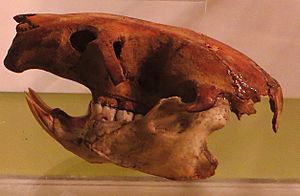Canariomys facts for kids
Quick facts for kids CanariomysTemporal range: Pleistocene to Holocene
|
|
|---|---|
 |
|
| Skull of Tenerife giant rat at Museo de la Naturaleza y el Hombre | |
| Scientific classification |
|
| Kingdom: | Animalia |
| Phylum: | Chordata |
| Class: | Mammalia |
| Order: | Rodentia |
| Family: | Muridae |
| Tribe: | Arvicanthini |
| Genus: | †Canariomys Crusafont-Pairó & Petter, 1964 / Lopez-Martinez & López-Jurado, L. F. (1987) |
| Species | |
Canariomys was a group of giant rats that are now extinct. They used to live on the islands of Tenerife and Gran Canaria, which are part of the Canary Islands in Spain. These amazing rats could weigh up to about 1 kilogram (2.2 pounds)! They were mostly plant-eaters, enjoying things like roots, ferns, and berries. They were one of two types of native rodents found in the Canary Islands.
Contents
About the Giant Canary Rats
The Canariomys were much larger than the rats we see today. They were a unique part of the animal life on the Canary Islands for a very long time.
Two Species of Giant Rats
Scientists have identified two main species of Canariomys:
- Tenerife giant rat, Canariomys bravoi: This species lived on the island of Tenerife.
- Gran Canaria giant rat, Canariomys tamarani: This species lived on the island of Gran Canaria.
What They Ate and Where They Lived
Both types of giant rats were mostly herbivores, meaning they ate plants. They probably enjoyed soft vegetables like roots, ferns, and berries. They did not seem to eat grass.
- The Canariomys bravoi from Tenerife likely lived in forests, especially areas with laurisilva trees. They were good at climbing trees.
- The Canariomys tamarani from Gran Canaria preferred more open areas. They were skilled at digging burrows underground.
Their Extinction
Both species of Canariomys disappeared around the beginning of the 1st millennium. This happened shortly after the first humans, known as the Guanches, settled on the islands. It is believed that the arrival of humans and the animals they brought (like cats and other rodents) led to the extinction of these giant rats.
Their Family Tree
Genetic studies show that Canariomys is related to a group of rats called Arvicanthis, specifically the African grass rat (A. niloticus). These giant Canary rats separated from their mainland relatives about 650,000 years ago.
See also
 In Spanish: Canariomys para niños
In Spanish: Canariomys para niños
 | Sharif Bey |
 | Hale Woodruff |
 | Richmond Barthé |
 | Purvis Young |

